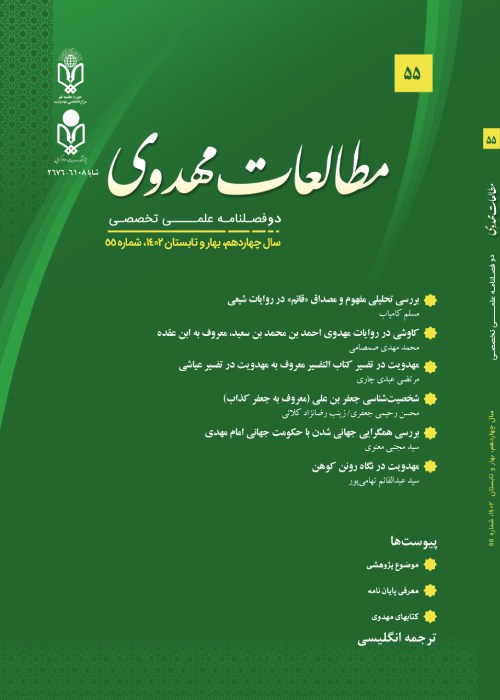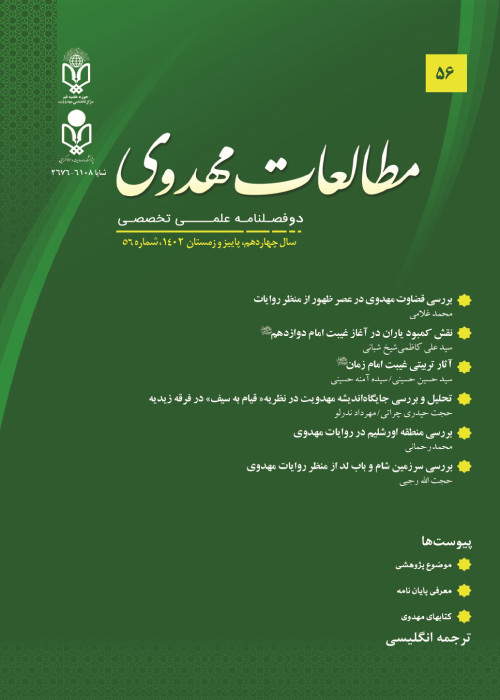فهرست مطالب

نشریه مطالعات مهدوی
پیاپی 55 (بهار و تابستان 1402)
- تاریخ انتشار: 1402/05/30
- تعداد عناوین: 8
-
صفحات 47-61
-
صفحات 63-75
-
صفحات 76-90
-
صفحات 91-101
- پیوست ها
-
صفحات 104-108
-
صفحات 109-116
-
Pages 9-31
The word “al-Qāʾim” is one of the most quoted titles in the narrations related to Mahdism; However, in Hadith-studies, this word has not been comprehensively and independently discussed. On the other hand, the abuse of related narrations to the issue of al-Qāʾim by some deviations through reconciling this title with some specific examples doubles the necessity of dealing with this term. The present article, by a descriptive-analytic approach and based on data-oriented information and through explaining the word “al-Qāʾim” and examining it in Shiite sources, it tries to depict as clear an image of this word as possible. This research shows that the mentioned word has been considered in two cases: the uprising of Ahl al-Bayt (the Infallible Imams of Shia) and the uprising of Imam Mahdi (pbuh). The second case, which has various functions, including the spread of justice and the stablishing of a world government, is only used for Imam Mahdi (pbuh) and other Infallible Imams, while denying to be the promised upriser, considered it exclusive to the last Imam, Imam Mahdi (pbuh); and there is not any Hadith about two or more uprisers at the Time of Appearance.
Keywords: Imamyah Hadith, Mahdism, al-Qāʾim, the Qaim of Ahl al-Bayt, the uprising of Imam Mahdi, straying movements in Mahdism -
Pages 33-45
A large part of the narrations and Hadiths of the Prophet and Imams has been dedicated to the issue of Mahdism and coming a divine savior at the End of Time; and some scholars, especially the scholars of the minor occultation, have played a more key role in promoting and publishing such narrations than other narrators. Among them, we can mention Aḥmad b. Muhammad b. Saʿīd known as Ibn-e ʿUqdah. This article aims to analyze Ibn-e ʿUqdah’s Mahdavi narrations with a descriptive-analytical method. With the typology of the narrations transmitted by him, this essay depicts the breadth and diversity of the Hadiths. Also his narrations, despite the fact that he believed in Zaydiyyah, shows the consistency of his narrations with the narrations of the Twelver Shia narrators, and also the incompatibility of some of his narrations with the beliefs of the Zaydism. And it tells about his confrontation with deviant sects such as Ismāiliyyah, Wāqifiyyah, and even the claim of being the promised Mahdi by some Zaydi leaders
Keywords: Aḥmad b. Muhammad b. Saʿīd (Ibn-e ʿUqdah), Mahdavi Hadiths, the Twelfth Imam, Zaydiyyah, Imamiyyah (the Twelver Shia) -
Pages 47-61
"Tafsir alʿAyyāshi", written by Muhammad bin Masʿūd Ayyāshi Samarqandi, one of the famous Muhaddithīn (the narrators of Hadiths) is one of the works that contains some Mahdavi narraitions. In this article, the author first examines the personality of this commentator and then seeks to answer the question of what position he had in the book of interpretation of Mahdavi topics based on the verses of the Holy Qur'an and what topics the author focused on. The following article tries to present only a clear picture of Mahdavi Muhammad bin Masʿūd’s narrations with a descriptive method. The findings show that in this commentary book, under the forty verses, several Hadiths have been narrated in the field of Mahdism. In these narrations, topics such as the position and lineage of Imam Mahdi, his companions, the Appearance, the dominance of Islam, and the partial resurrection (Rajˈat) can be seen, which have paid attention to the needs of the society and the intellectual demands of Muslims.
Keywords: Mahdism, narrative interpretations, Tafsir alʿAyyāshi, Mahdavi Hadiths -
Pages 63-75
With regard to the importance of the issue of Imamate throughout the history of Shia and the special position of Imam Mahdi (pbuh) as the last successor of Prophet Muhammad (pbuh and his pure family) and the founder of divine justice government and the eradicator of oppression, some individuals throughout the history of Islam have made various claims to gain this significant position. What highlights the importance of this writing is the character of Jaˈfar b. Ali who arose from the family of the Prophet and Imams seeking to introduce himself as Imam. This article is trying to investigate the personality and beliefs of Jaˈfar Kazzāb (very liar) and the impact of his claim in the critical early period of Imam Mahdi’s disappearance. This paper, by the Library-based method with a descriptive-analytic approach and based on the historical sources and Hadith-reports, is looking for findings related to the deviant personality of Jaˈfar b. Ali from the text of Hadiths and the attitude of the Imams towards him.
Keywords: Jaˈfar bin Ali, Jaˈfar Kazzāb, the Occultation era, claiming to be the Imam, to claim for the inheritance -
Pages 76-90
"Globalism convergence", as the infrastructure of Imam Mahdi’s global government, is the subject has proceeded in the present article. Knowing a right model, or discovering it, for the purpose of moving towards the advent of Imam Mahdi is a necessary issue. The aim of this research is to provide a suitable indicator for evaluating the coordination of the globalization as one of the emerging events in the pre-Appearance era with the global government of Imam Mahdi (pbuh). The analysis of globalization in three political-social, cultural, and economic fields shows that this event, as one of the events before the Imam’s advent, can be consistent with the universal Imam Mahdi’s ruling. As an important indicator, ignoring the geographical borders by human societies and also the tendency of subcultures to a common culture, it promises the progress of societies to a single model for governing the world. This movement gradually overcomes differences and reaches a common position as a common tendency towards the world government of Imam Mahdi (pbuh).
Keywords: globalism, Mahdism, global government of Imam Mahdi, globalization -
Pages 91-101
Dr. Ronen Cohen is one of the contemporary Israeli orientalists, who has researched Shiism and Mahdism in addition to Iranian studies and political issues in the Middle East. He has many works in various fields such as Islam, Persian language, Middle East, and political parties in Iran. In his book, called "Hujjatiyah association", Cohen deals with the historical background of the formation of “Guardianship of the juris consult” (Wilāyat al-Faqīh) and “Ḥujjatiyah association”, and points to the origin of Shiism and the principles of Shia belief, as well as the role and position of Imams in this religion and the fundamental differences between Shia and Sunni. In this paper, by referring to Ronen Cohen's writings, with a library method, his important views have been investigated about Shiism and especially Mahdism. Despite some of Cohen's incorrect comments and comparing his view with some fanatical and biased Orientalists, it seems that he is trying to provide a correct description of Shiism and the issues related to Mahdism, such as the situation of Shiism during the occultation of Imam Mahdi (pbuh).
Keywords: Shiism, Mahdism, orientalists, Ronen A. Cohen, Ḥujjatiyah association


